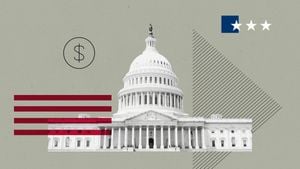Allan Lichtman, often dubbed the 'Nostradamus of the US elections', has made headlines recently after both his prediction about Kamala Harris winning the 2024 election turned out to be wrong and his decision to leave X, formerly Twitter. The historian, renowned for his ability to accurately forecast the outcomes of nearly every presidential election since 1984, faced strong backlash this time around. Following this latest election, which saw Donald Trump securing about 312 electoral votes and winning the popular vote by approximately 3.2 million votes, Lichtman pointed fingers at rising misinformation online, particularly narratives fueled by powerful figures like Elon Musk.
Lichtman’s method of predicting electoral outcomes relies on what he calls the '13 keys' model. This model evaluates various political, economic, and social factors to determine the likely victor of elections. Despite past successes, his latest failure has prompted fresh scrutiny of his methods, especially against the backdrop of the current complex digital age, where misinformation spreads like wildfire and can distort public perception.
His debate with Cenk Uygur, another prominent commentator, turned heated as they discussed the reasons behind his faltering prediction. Uygur challenged Lichtman, leading to the historian deciding to take his political insights to Bluesky, stepping away from the rapidly changing and often chaotic platform of X.
But Lichtman’s troubles with predictions aren’t isolated to his part. Media analysts worldwide are also reevaluated post-election. The 2024 election saw pollsters facing harsh criticism after failing to forecast Trump’s win accurately, many of whom predicted neck-and-neck races.
Despite the “neck-and-neck” predictions leading up to the election, the results left many wondering what went wrong. Robert Preuhs, a political science professor at Metropolitan State University, suggested this backlash stems from public misunderstandings of how polling operates.
“Polling is meant to be estimative,” Preuhs said. “Expecting precise figures from polls neglects the nature of their methodology.” He indicated the importance of acknowledging margins of error, which average between 3-4%, as this often leads to misinterpretations of polling data.
With Trump’s victory, many pointed fingers at pollsters who had declared the race extremely close. Headline after headline criticized various groups involved with polling, prompting renewed scrutiny of their methodologies and predictions. Some high-profile names also misjudged the race—Nate Silver, for example, used sophisticated modeling techniques only to misfire spectacularly.
Preuhs emphasized the necessity of treating polls as estimates rather than definitive forecasts. He underscored the usefulness of aggregated polling data, for example, pollsters like RealClearPolitics were less than 2% off predictions within swing states, which he found indicative of their utility.
Yet the conversation about the value of polling continues. Preuhs argues this scrutiny highlights something larger at stake: the role of reliable information in the electoral process and the political divides within the country.
Another important aspect of the 2024 election was the standing of voters, particularly those traditionally considered swing voters. Polls indicated significant shifts among various demographics compared to the preceding election cycles.
This increased focus on nuanced voter behaviors underlines the importance of not only polling accuracy but also the narratives used during campaigns. Cultural identity, geography, age, and societal influences all converge to shape voter inclinations.
While polls have certainly faced their share of criticism, experts like Preuhs argue their continued existence is non-negotiable—acting as both facilitators and reflections of the populace's beliefs.
So, the big question remains: with the digital age altering our relationship with information, how can predictors and pollsters adapt? Perhaps as Lichtman transitions to Bluesky, he’ll find new ground amid the shifting political tides. But one thing is clear – the question of credibility and reliability continues to loom large over the 2024 predictions and the broader political arena.



